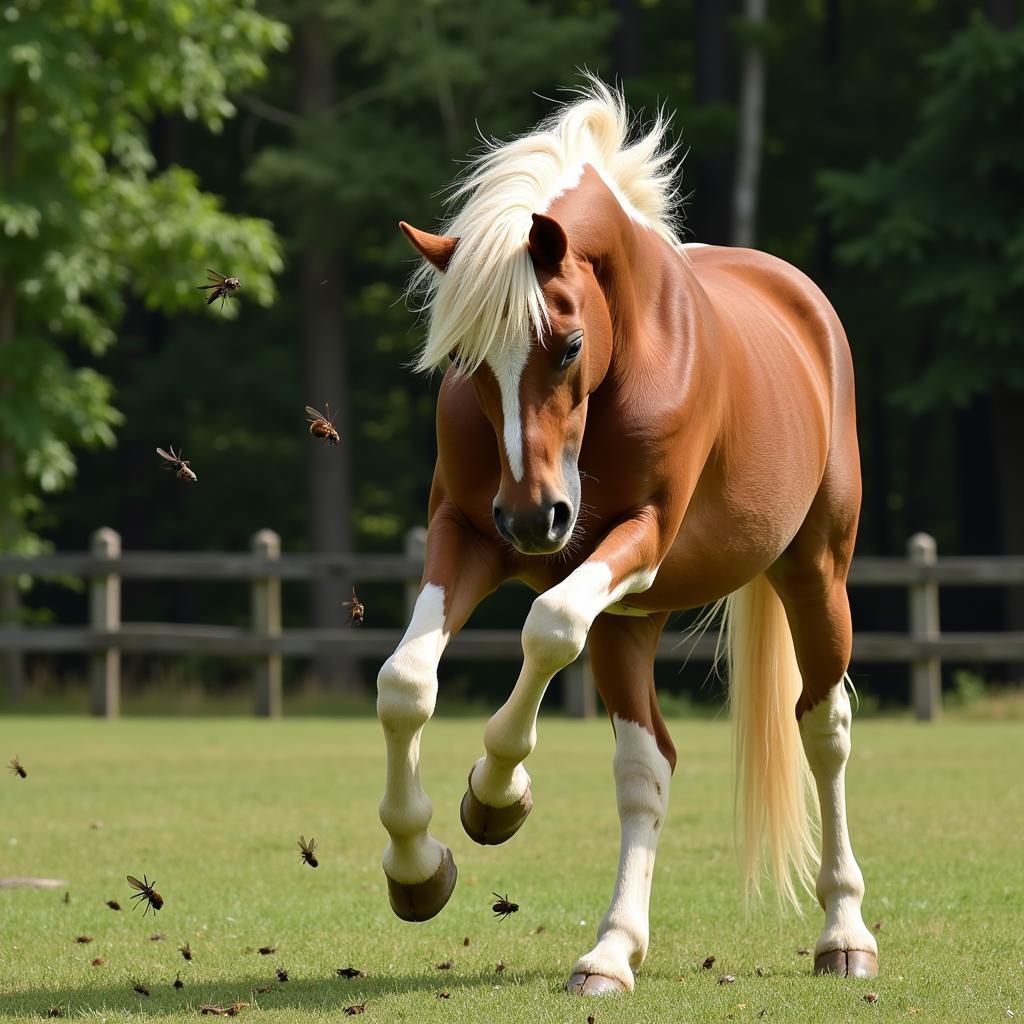A Horse Shake can be concerning for any owner. It can signify anything from a simple fly annoyance to a more serious underlying health issue. Understanding the reasons behind why your horse shakes is crucial for providing appropriate care and ensuring their well-being. This article dives deep into the various causes, symptoms, and solutions related to equine tremors.
Decoding the Horse Shake: Causes and Concerns
There’s a multitude of reasons why a horse might shake. Some are completely benign, while others require immediate veterinary attention. Let’s explore some of the most common culprits.
Cold Weather Shivers
Just like humans, horses can get cold! A horse shake in cold weather is often a natural response to dropping temperatures. They might also shiver if they are wet and the wind picks up, increasing the chill. Providing adequate shelter and blankets can help alleviate this type of shivering.
Fear and Anxiety
Horses are prey animals, and they can become easily frightened. A sudden loud noise, an unfamiliar object, or even separation from their herd can trigger a fear response, resulting in shaking. Building trust and slowly introducing your horse to new situations can help minimize anxiety-related tremors.
Excitement and Anticipation
Sometimes, a horse shake isn’t a sign of distress but rather of excitement! A horse anticipating a ride, a treat, or even just seeing their owner can exhibit a slight tremor. This is usually short-lived and nothing to worry about.
Muscle Fatigue and Strain
After strenuous exercise, horses can experience muscle fatigue and even minor strains. This can manifest as shaking, especially in the legs. Proper conditioning, warm-up exercises, and cool-down routines can help prevent this.
Neurological Issues
In some cases, a horse shake can indicate a more serious underlying neurological problem. Conditions like Equine Protozoal Myeloencephalitis (EPM) can cause a range of neurological symptoms, including tremors, incoordination, and muscle weakness. If you notice persistent or worsening tremors, consult a veterinarian immediately.
Insect Bites and Allergies
Flies, mosquitoes, and other biting insects can irritate horses, leading to shaking and skin twitching. Using fly spray, wearing fly masks and sheets, and maintaining a clean stable environment can help minimize insect-related discomfort. You might also want to try making your own how to make fly spray for horses.
Recognizing the Signs: When to Worry
While an occasional horse shake might not be cause for alarm, certain accompanying symptoms warrant further investigation. These include:
- Fever
- Lethargy
- Loss of appetite
- Incoordination
- Muscle weakness
- Changes in behavior
If you observe any of these signs in conjunction with shaking, consult a veterinarian promptly.
 Horse Shaking from Insect Bites
Horse Shaking from Insect Bites
Managing and Preventing Horse Shakes
Addressing the underlying cause is key to managing and preventing horse shakes. Here are some practical tips:
- Provide adequate shelter and blankets in cold weather.
- Create a calm and predictable environment to reduce anxiety.
- Implement a consistent exercise program with proper warm-up and cool-down routines.
- Use effective insect control measures.
- Consult your veterinarian for regular check-ups and to address any underlying health concerns.
Remember, preparing for a horse show spray can also sometimes cause anxiety in horses leading to shaking. Be mindful of your horse’s behavior and adjust your preparations accordingly.
Conclusion
Understanding why your horse shakes is crucial for their health and well-being. From simple chills to more serious health conditions, knowing the causes and recognizing the signs can help you provide the best possible care. If you’re ever unsure about your horse’s shaking, consult with a qualified veterinarian. A horse shake can be a minor issue or a sign of something more significant. By staying informed and proactive, you can ensure your equine companion remains happy and healthy.
FAQs
- Is it normal for a horse to shake after exercise? Yes, a slight tremor after strenuous exercise can be normal due to muscle fatigue.
- Should I be concerned if my horse shakes in the cold? Shivering in cold weather is a natural response. Provide adequate shelter and blankets.
- What are some signs that my horse’s shaking is serious? Accompanying symptoms like fever, lethargy, incoordination, or muscle weakness warrant veterinary attention.
- How can I prevent my horse from shaking due to insects? Use fly spray, fly masks and sheets, and maintain a clean stable environment.
- Can stress cause a horse to shake? Yes, fear, anxiety, and even excitement can trigger shaking in horses.
- What is EPM and how is it related to horse shaking? EPM is a neurological disease that can cause tremors, among other symptoms. Consult a veterinarian for diagnosis and treatment.
- My horse shakes sometimes when I bring him his feed. Is this normal? This could be a sign of excitement or anticipation, which is generally not a cause for concern. However, if the shaking is severe or accompanied by other symptoms, it’s best to consult a veterinarian.
Have you checked out our cameras for horse riding? They’re a great way to capture memories and analyze your riding technique. We also have a unique horse snowglobe available in our store. It’s a perfect gift for any horse lover! Sadly, there’s a missing woman hungry horse mt and we hope she is found safe.
Need more help? Contact us at Phone: 0772127271, Email: [email protected] or visit us at QGM2+WX2, Vị Trung, Vị Thuỷ, Hậu Giang, Việt Nam. Our customer service team is available 24/7.